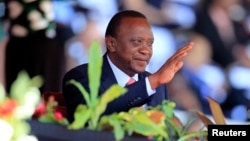NAIROBI —
Kenya's president and Cabinet on Friday agreed to a pay cut as part of austerity measures meant to reduce the government wage bill and free up funds for use in economic development - and called on lawmakers to do the same.
Uhuru Kenyatta announced a month after his election in March last year that he would make reducing Kenya's ballooning public sector wage bill a priority, saying it was "unsustainable" and weighing on the national budget.
The move was also a nod to public opinion, which often expresses anger at the salaries of public officials which are many times higher than those of ordinary Kenyans.
On Friday, Kenyatta said he and Deputy President William Ruto will be taking a 20 percent cut on their monthly pay, and that the country's 18 Cabinet secretaries had agreed to take a 10 percent pay reduction. The pay cuts take effect immediately.
Kenyatta earns a salary of 1.2 million shillings ($13,900) a month, his deputy earns 1.1 million shillings while Cabinet secretaries earn about 800,000 shillings.
The country's minimum wage is about 5,756 shillings a month.
The government would also only restrict international travel for its officials to only essential trips, he said.
"Wastage in my government will be significantly reduced," the president told a news conference after a week-long meeting by the cabinet at a luxury resort in Nanyuki, central Kenya.
Kenyatta said the actions would "demonstrate our firm resolve to properly manage" public funds.
Asked whether Kenya's legislators, who are among the best paid in Africa, would also take a pay cut, Kenyatta said he would urge them to do so.
A move in June granting MPs extra allowances angered many in a country where the official unemployment rate stands at 40 percent.
He said the cabinet had singled out the need for more spending in security, to buy more equipment such as cars, better housing and life insurance for each police officer to help improve security and attract investment.
In a speech last April, Kenyatta said that at around 458 billion shillings public sector wages made up 12 percent of Kenya's gross domestic product, compared to a "globally recommended average of seven percent of GDP."
In January, Kenyatta ordered an audit of the public sector payroll to end the practice of corrupt officials claiming salaries on behalf of "ghost employees" - workers who have died, retired or deserted their duties.
At the time, the president said an estimated 70 million shillings were paid out a month to officers no longer employed in the service or about 1.8 billion shillings annually.
Kenya's economy expanded at a below-target 5.1 percent in 2013 but growth is expected to accelerate to 5.8 percent this year, the Treasury said in January.
($1 = 86.6300 Kenyan shillings)
Uhuru Kenyatta announced a month after his election in March last year that he would make reducing Kenya's ballooning public sector wage bill a priority, saying it was "unsustainable" and weighing on the national budget.
The move was also a nod to public opinion, which often expresses anger at the salaries of public officials which are many times higher than those of ordinary Kenyans.
On Friday, Kenyatta said he and Deputy President William Ruto will be taking a 20 percent cut on their monthly pay, and that the country's 18 Cabinet secretaries had agreed to take a 10 percent pay reduction. The pay cuts take effect immediately.
Kenyatta earns a salary of 1.2 million shillings ($13,900) a month, his deputy earns 1.1 million shillings while Cabinet secretaries earn about 800,000 shillings.
The country's minimum wage is about 5,756 shillings a month.
The government would also only restrict international travel for its officials to only essential trips, he said.
"Wastage in my government will be significantly reduced," the president told a news conference after a week-long meeting by the cabinet at a luxury resort in Nanyuki, central Kenya.
Kenyatta said the actions would "demonstrate our firm resolve to properly manage" public funds.
Asked whether Kenya's legislators, who are among the best paid in Africa, would also take a pay cut, Kenyatta said he would urge them to do so.
A move in June granting MPs extra allowances angered many in a country where the official unemployment rate stands at 40 percent.
He said the cabinet had singled out the need for more spending in security, to buy more equipment such as cars, better housing and life insurance for each police officer to help improve security and attract investment.
In a speech last April, Kenyatta said that at around 458 billion shillings public sector wages made up 12 percent of Kenya's gross domestic product, compared to a "globally recommended average of seven percent of GDP."
In January, Kenyatta ordered an audit of the public sector payroll to end the practice of corrupt officials claiming salaries on behalf of "ghost employees" - workers who have died, retired or deserted their duties.
At the time, the president said an estimated 70 million shillings were paid out a month to officers no longer employed in the service or about 1.8 billion shillings annually.
Kenya's economy expanded at a below-target 5.1 percent in 2013 but growth is expected to accelerate to 5.8 percent this year, the Treasury said in January.
($1 = 86.6300 Kenyan shillings)





